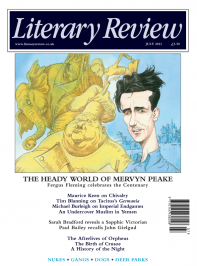Fergus Fleming
Peake’s Progress
By Mervyn Peake
In 1939 Mervyn Peake inveigled his wife-to-be, Maeve Gilmore, to his room in Battersea. It was a damp, run-down place on the first floor with few facilities. But it had a bed, which was the important thing. In the middle of the night, however, they were woken by noises from beneath, and when they lit the candle they saw the floorboards were moving. Peake leapt up, and threw back the rug to reveal a trapdoor. He threw that back too. While they were asleep a circus had moved into the ground floor, and an elephant was scratching its back against the beams. For the rest of the night they fed it buns.
Every fan has their favourite moment of Peake quirkiness, and this is mine. Less for the elephant than the trapdoor: anybody can see an elephant, but only Peake could have done so through a trapdoor. In fact, only Peake could have had a trapdoor in his bedroom in

Sign Up to our newsletter
Receive free articles, highlights from the archive, news, details of prizes, and much more.@Lit_Review
Follow Literary Review on Twitter
Twitter Feed
Russia’s recent efforts to destabilise the Baltic states have increased enthusiasm for the EU in these places. With Euroscepticism growing in countries like France and Germany, @owenmatth wonders whether Europe’s salvation will come from its periphery.
Owen Matthews - Sea of Troubles
Owen Matthews: Sea of Troubles - Baltic: The Future of Europe by Oliver Moody
literaryreview.co.uk
Many laptop workers will find Vincenzo Latronico’s PERFECTION sends shivers of uncomfortable recognition down their spine. I wrote about why for @Lit_Review
https://literaryreview.co.uk/hashtag-living
An insightful review by @DanielB89913888 of In Covid’s Wake (Macedo & Lee, @PrincetonUPress).
Paraphrasing: left-leaning authors critique the Covid response using right-wing arguments. A fascinating read.
via @Lit_Review